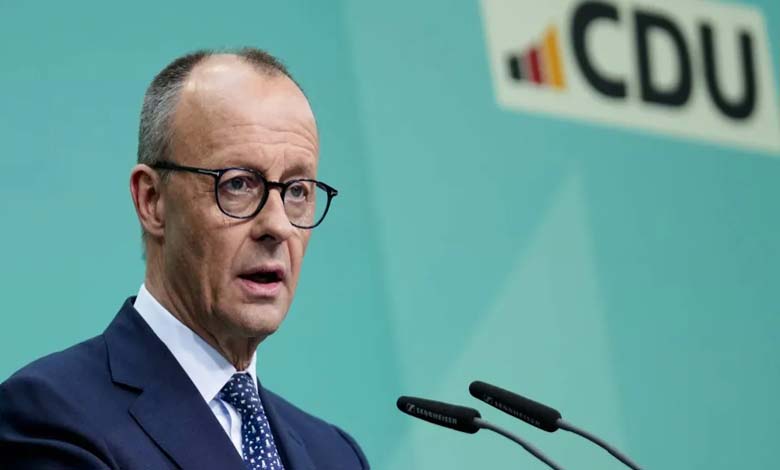German Government: What Does Merz’s Victory Mean for Political Islam Organizations?

The final whistle of the German elections has blown, with a widely expected victory for the Christian Union under Friedrich Merz’s leadership, marking a challenging reality for political Islam organizations.
Merz, who will form the next government as chancellor, has taken a strong stance against political Islam organizations in Germany. He is committed to combating these movements, cutting off their funding channels, and restricting their operational scope.
-
Germany Prepares for a World War… “Protective Trenches” Linked to an Electronic “Fingerprint”
-
German Analyst Reveals: Our Country Fights All Terror Centers and Organizations Affiliated with Iran and the Muslim Brotherhood
Furthermore, Merz leads a group of hardliners within the party, including the party’s Secretary General, Carsten Linnemann. These figures hold strong positions on immigration and political Islam, particularly targeting the Muslim Brotherhood, which has a significant and concerning presence in Germany.
Secretary General Carsten Linnemann even published a book a few years ago titled “Political Islam Does Not Belong to Germany”, and he is among the most vocal advocates for intensifying measures against these movements.
-
Cold War on the Horizon… Russia: European Capitals are Targets if Missiles are Deployed in Germany
-
Le Pen calls for a national unity government ahead of parliamentary elections
But this is not just about leaders with a strict approach to combating political Islam. Since Merz and his hardliners took over the Christian Union’s leadership in early 2022, the party has submitted dozens of inquiries and policy proposals against political Islam, most of which bear Merz’s signature as the parliamentary bloc leader.
What About the Policies?
The Christian Union also incorporated strict policies against political Islam in its current election program, which are expected to be central to the governing coalition’s agreement.
The party’s 82-page program, states: “We view extremist threats from all angles. We combat all forms of extremism, violence, and terrorism with full force.”
-
Bill Before Parliament… Will Germany Ban the Muslim Brotherhood?
-
Germany lifts the ban on selling fighter jets to Saudi Arabia
The program outlines the following measures:
- Classifying support for terrorist organizations as a punishable crime, with actions against perpetrators, including deportation, revocation of residence permits, and loss of German citizenship.
- Closing mosques that preach hatred and antisemitism.
- Ensuring no legal loopholes for Islamist movements (suggesting preparations to reassess the traditional classification of some Islamist groups, like the Muslim Brotherhood, as legal and non-violent).
- Taking action against unconstitutional symbols, as well as unconstitutional and antisemitic statements.
- Ending “remote-controlled Islam” by eliminating foreign government influence on German Muslims through mosque associations and Islamic organizations.
Under the section “Continuously Fighting Enemies of Our State,” the Christian Union identifies Islamist organizations as major threats, stating: “Islamist terrorism and political Islam are dangers we do not underestimate.”
-
Germany is in the forefront of supporting Israel’s massacre of civilians in Gaza.. This is what it has provided in terms of weapons
-
The German parliament is discussing two draft laws related to the Muslim Brotherhood
It further adds: “We closely examine the ideological grounds that foster this politically motivated religious extremism. We do not tolerate any safe havens and shut down mosques where hatred and antisemitism are preached. We work on expanding fundamental research in universities on violent and non-violent Islamism and aligning it with our security authorities’ measures.”
Additionally, it states: “We are in the process of re-establishing a Political Islam Expert Group” to study the phenomenon and provide guidance to the new government.
-
The Muslim Brotherhood and its arms permeated Germany deeply
-
Germany.. Parliamentary Movements to Control the Activities of the Brotherhood; Details
Funding of Islamist Organizations
The Christian Union also addresses the issue of funding for Islamist organizations, stating: “We enforce a disclosure requirement on funding and donors (of these organizations). As a general rule, associations and organizations receiving funds from foreign governments or affiliated entities cannot receive government funding in Germany or cooperate with our governmental agencies.”
Observers anticipate that the Christian Union’s rule will be the toughest period for political Islam in Germany, with strict policies expected, potentially leading to the banning of many organizations.












